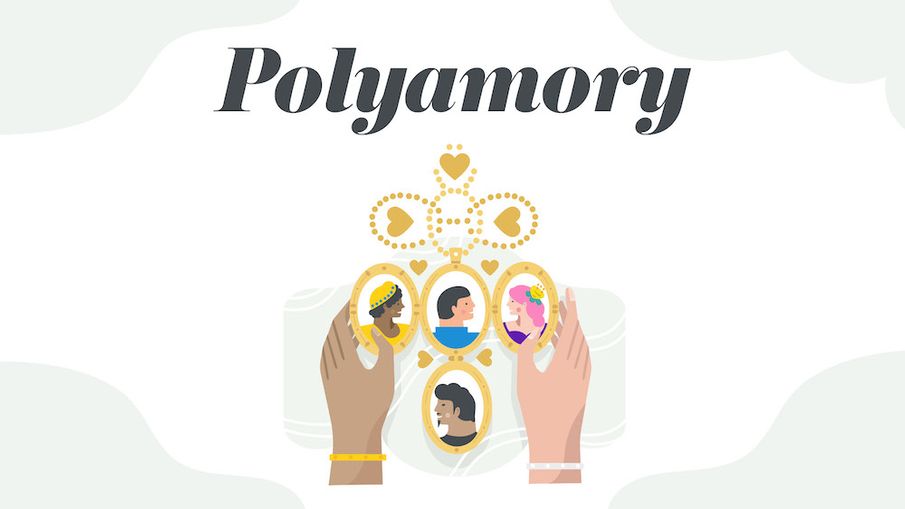Not sure if there’s one person out there for you? Got a lot of love to give? We take a closer look at the non-monogamous approach to relationships
Love stories are almost always told through one narrative. Someone meets their soulmate, fireworks ensue. It all leads to a big white wedding, and a gaggle of children. They live happily ever after.
It’s safe to say, even for those of us who fit the heteronormative monogamous stereotype, this story isn’t always relatable.Love is complex and, for some, monogamy (being with only one other person in a relationship) doesn’t suit the way they want to express it.
Enter, polyamory – from Greek poly, ‘many, several’, and Latin amor, ‘love’. Someone who is polyamorous will either have, or be open to having, more than one romantic relationship at a time, with the understanding and consent of all involved.
Mental health blogger Lindsay Hughes tells us about her own experience: “I became aware of polyamory via someone on social media. The set-up she has with her partner seemed to work well for them, and it was refreshing to see a non-conventional relationship where both partners were supported, and seemed to flourish with each other as well as others.”
Lindsay and her partner of five years started discussing polyamory at the start of this year. “It’s working for us at the moment. It would be difficult to disengage from it now we’ve started, but if, in the future, it no longer suits us, then we would transition back to monogamy, or inactive polyamory.”
For Lindsay and her partner, polyamory isn’t about sex (a common misconception). “We very much value the emotional connection with others, as well as between us as a couple.”
So, can you really love more than one person at a time?
This question is often asked, and assumes we only have a finite amount of love to give. A lot of people, polyamorous or not, believe this isn’t the case. Many in the polyamorous community believe that the more giving you are with your love, the greater your capacity to love becomes.
But being in love doesn’t mean relationships are smooth sailing, and isn’t an excuse to do whatever you like. Those in polyamorous relationships will often discuss ground rules to ensure everyone is comfortable with what behaviour is OK, and what’s not.
What are the downsides?
Taking an approach that’s outside of social norms doesn’t come without its challenges. According to counsellor Alex Sanderson-Shortt, dealing with other people’s opinions can be tricky to negotiate.
“Decisions need to be made about who knows what about your relationship. Living with these kinds of secrets can be stressful for people, and affect relationships.”
Jealousy is another issue that can come up. “It’s a common misconception that poly people don’t get jealous – we do! We learn to manage it with open and regular communication, and often clearly negotiated boundaries,” Alex says.
For Lindsay, disengaging from monogamy has been most challenging. “I’m an anxious person, and I’ve struggled with feelings of guilt. As though I shouldn’t be feeling a certain way about someone else, even though we know it’s OK.”
What are the benefits of polyamory?
Many in the polyamorous community believe that the more giving you are with your love, the greater your capacity to love becomes
Alongside the challenges, polyamory also offers unique benefits. Lindsay notes: “It’s not that my partner and I don’t meet each others’ needs, but you don’t necessarily share everything with one person. I think that relying on one person to meet all your needs may not always be the best idea.”
She also says her confidence has been boosted by meeting others. “My partner and I are both quite anxious, so it hasn’t always been easy, but there’s something lovely about meeting someone completely new and developing a relationship.”
For Lindsay, it’s this meeting new people, and the self-awareness polyamory facilitates, that helped her tackle her social anxieties, and made her more resilient.
If you’re thinking of trying polyamory…
Counsellor Alex reiterates that communication is key. “Managing any form of consensual non-monogamy needs communication. There needs to be resilience and a support network, as it is still considered odd by many. It can be a really positive experience, and should be celebrated as such when everyone feels they have a fully-consensual experience within the relationship.”
Lindsay concurs, and adds that taking it slowly and talking about emotions is essential. She also reminds us that it’s OK if this approach doesn’t feel right for you, and that you should never feel pressured into it: “It only works if you both want to do it.”
Stepping outside of societal norms can feel daunting, but for many it’s also liberating. Our advice? Educate yourself on your options, keep communicating, and find a way of loving others that feels good to all involved.
Read more about Lindsay and her mental health journey at seedsinthewasteland.co.uk


Comments